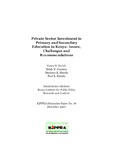| dc.description.abstract | Although many governments are committed to implementing
education goals, including Education for All (EFA) and Universal
Primary Education (UPE), they are constrained by availability of
resources. Private sector involvement in education has been justified
on the grounds that public provision of education is inadequate
compared to demand. Also, public expenditure on education has
stagnated or shrunk in real terms due to fiscal constraints. This study
utilized both primary and secondary data sources to analyze the critical
policy issues and challenges facing private investors in the education
sector in Kenya. The owners of schools were the main sources of
primary data.
Analysis from the data shows that private investors had invested more
in primary schools compared to secondary schools, despite the unmet
demand for secondary education. The investors indicated that it was
relatively cheaper to establish and operate a primary school than a
secondary school. The investors also cited the inability to meet the high
initial capital to start a secondary school. This problem is compounded
by the fact that majority of private schools mainly depend on
proprietor’s savings to construct a school. Their ability to access bank
credit is hampered by the fact that banks charge very high interest
rates. Also, potential investors lack necessary collateral to secure a
loan. Further, the current legal framework that regulates education
provision in Kenya is limited to private school registration and
examinations.
Policy recommendations emanating from the study include need to
speed up the review of the Education Act—it is expected that the review
will address issues of registration; land norm and investment
incentives; enforcement of regular inspection of schools, teacher in-
service and other professional development programmes; a revolving
fund for long term credit facilities; and development of a legal
framework on private-public partnership in the provision of educatio | en |

